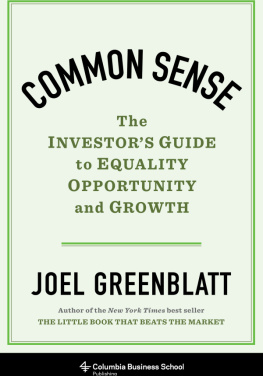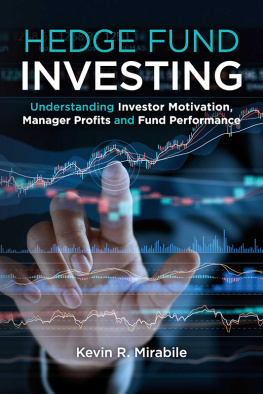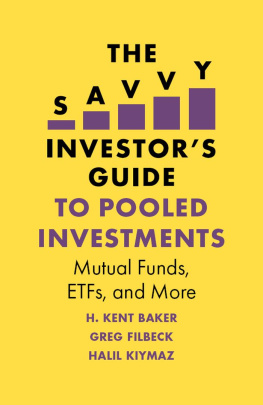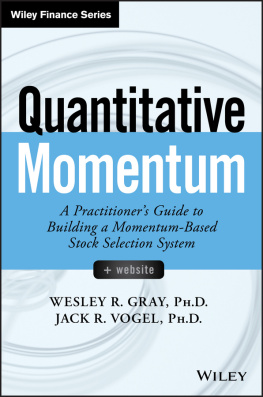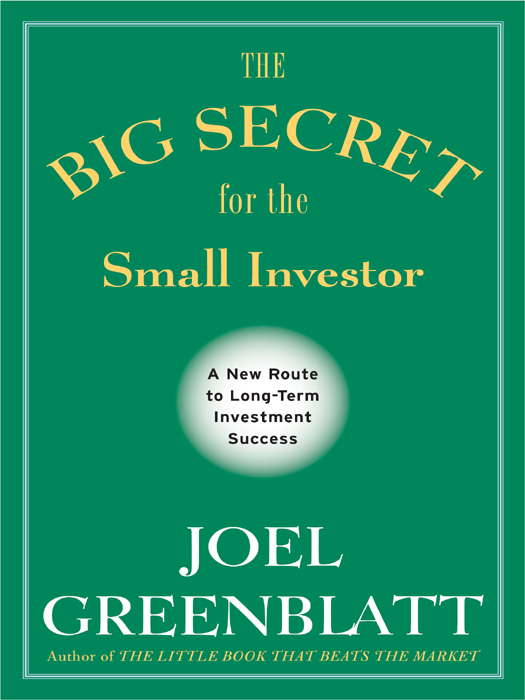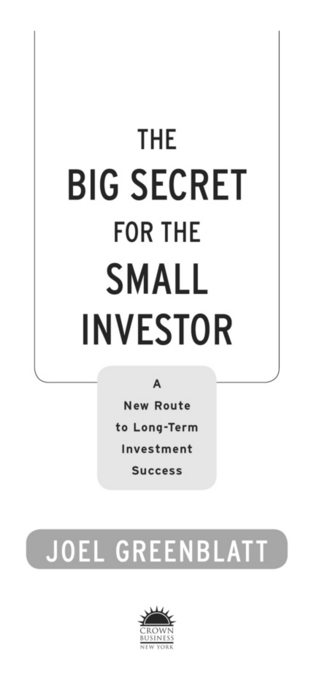Copyright 2011 by Joel Greenblatt
All rights reserved.
Published in the United States by Crown Business, an imprint of the Crown Publishing Group, a division of Random House, Inc., New York.
www.crownpublishing.com
CROWN BUSINESS is a trademark and CROWN and the Rising Sun colophon are registered trademarks of Random House, Inc.
Library of Congress Cataloging-in-Publication Data
Greenblatt, Joel.
The big secret for the small investor : a new route to long-term investment success / Joel Greenblatt.1st ed.
p. cm.
1. Investments. 2. Stocks. 3. Portfolio management. I. Title.
HG4521.G696 2011
332.6dc22
2010051747
eISBN: 978-0-307-72078-8
v3.1_r1
To my wonderful wife, Julie,
and our five magnificent spinoffs.
CONTENTS
INTRODUCTION
When it comes to investing in the stock market, investors have plenty of options:
- They can do it themselves. Trillions of dollars are invested this way. (Of course, the only problem here is that most people have no idea how to analyze and choose individual stocks. Wait, did I say the only problem? I really meant most investors have no idea how to construct a stock portfolio, most have no idea when to buy and sell, and most have no idea how much to invest in the market in the first place. Okay, thats better.)
- They can give it to professionals to invest. Trillions of dollars are invested this way. (Though, after fees and other institutional impediments, most dont add value. In fact, most professionals actually underperform the market averages over time. Oh, I almost forgotit may be even harder to pick good professional managers than it is to pick good individual stocks.)
- They can invest in traditional index funds. Trillions of dollars are also invested this way. (This is a great way to match the major market averages, to pay very low fees, and to beat most professional managers. Then again, investing this way is seriously flawedand almost a guarantee of subpar investment returns over time.)
- They can read The Big Secret for the Small Investor and do something else. Not much is invested this way. (Yet )
For years individual investors have asked me how they should go about investing their savings in the stock market. After all, Im a longtime business school professor and institutional money manager, and they figure I should know. Yet for years I havent had a good answer. You see, Wall Street isnt very kind to small investors. While its true that individual investors have many options, for one reason or another (and usually one reason and another) most choices arent very good. Well, with this book, I finally have what I think is a good answer to that very important question. And its an answer that should work well for investors both big and small.
Then again, this is my third investing book. The first one, You Can Be a Stock Market Genius (yes, I know, I know), was meant to help the individual investor, too. It didnt. It assumed investors had a lot of specialized investment knowledge and a lot of free time. (Actually, it did end up helping a few dozen hedge fund managers, but ) My second book, The Little Book That Beats the Market, gave a step-by-step method for the individual investor to just do it yourself. I still believe strongly in this method and I still love that book. But here, too, I missed the boat. As it turns out, most people dont want to do it themselves. Yes, they want to understand it. But they still want someone else to do it for them.
So maybe the third time really is the charm. The Big Secret for the Small Investor should be a great answer for many investors. I dont think most individual or even institutional investors have considered this solution for how best to invest in the stock market. I sincerely believe they should. In any case, I think both novice and sophisticated investors will benefit from the discussion. Good luck.

W hen I went to business school back in the late seventies (note to my kids: thats the 1970s!), we learned one important thing about stock market investing. It was simply this: there are so many smart people out there, you cant outsmart them. In other words, thousands of intelligent, knowledgeable people buy and sell stocks all day long, and as a result, stock prices reflect the collective judgment of all these smart people. If the price of a stock is too high, these smart people will sell until the price comes down to a lower, more reasonable price. If a stock price is too low, smart people will go in and buy until the stocks price rises to a fair level. This whole process happens so quickly, we were taught, that in general stock prices correctly reflect all currently available information. If, indeed, prices are accurate, there is no use in trying to beat the market. In other words, according to my professors, the only way I was going to find a bargain-priced stock was by luck.
Naturally, I didnt listen (which, unfortunately, made this no different from most of my other classes).
But flash forward a few decades and now Im the professor. Each year I teach a course in investing at a top Ivy League business school. The students are clearly smart, accomplished, and dedicated. In short, they are the best and the brightest. But every year for the last fourteen, I have walked into class on the very first day and told my students something eerily familiar and very disturbing. I tell them this: Most of your peers and predecessors who learn about investing at business schools across the nation and beyond will go out into the real investing world and try to beat the market. And almost all of them will do one thing in commonfail!
How can this be? If brains and dedication arent the deciding factors in determining who can be a successful investor, what are? If an Ivy League business school education doesnt determine investment success, what does? Are we really just back to where we started? After decades of investment experience and learning, were my business school professors right after all? The only way to beat the market is by luck?
Well, not exactly. Im still glad I didnt listen to my professors. Investors can beat the market. Its just that becoming a successful investor doesnt have much to do with being one of the best and the brightest. It doesnt have much to do with attending a top business school (though being stupid with no degree isnt much help, either). Success also has nothing to do with an ability to master the economic and business news that bombards us each day. And success cant be found by following the hundreds of expert opinions offered on television, in newspapers, and in investment books. The secret to beating the market, as unlikely as it sounds, is in learning just a few simple concepts that almost anyone can master. These simple concepts serve as a road map, a road map that provides a way through all the noise, confusion, and bad directions. A road map that most smart MBAs, investment professionals, and amateur investors simply dont have.
And that makes sense. If being smart or having a business degree were all it took, there would be many thousands of individual and professional investors with great long-term investment records. There arent. The answer, it seems clear, must lie elsewhere.


